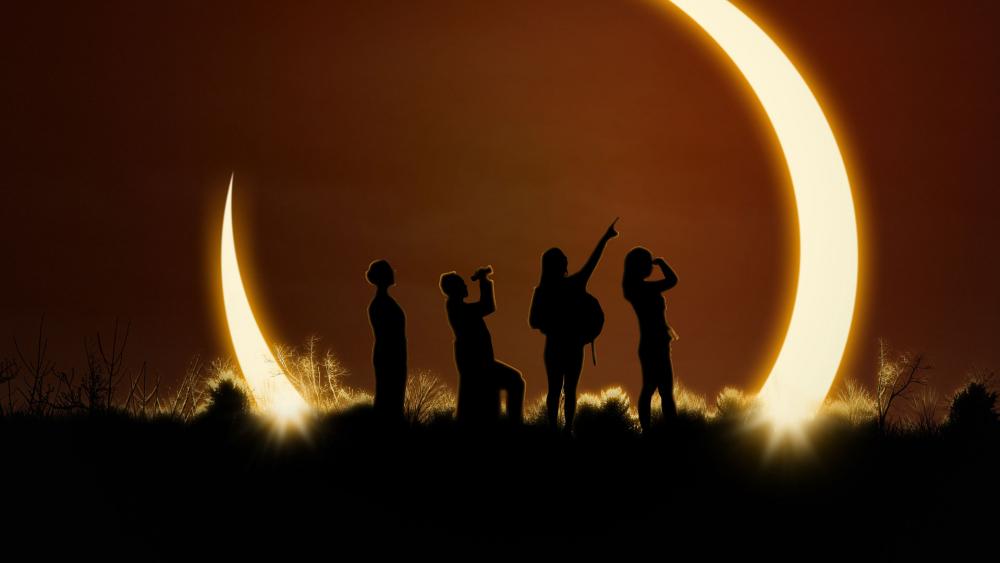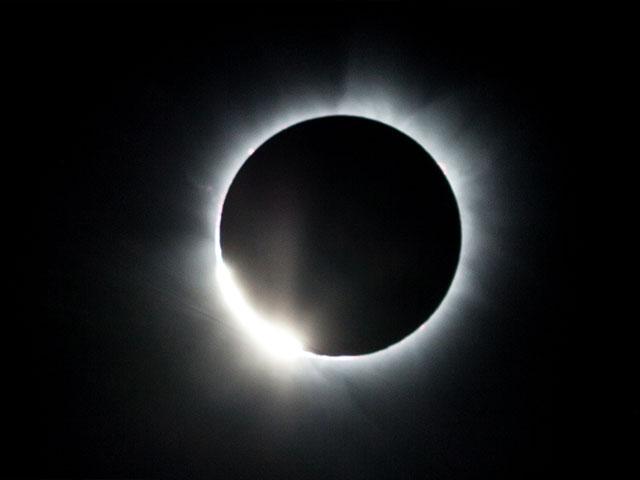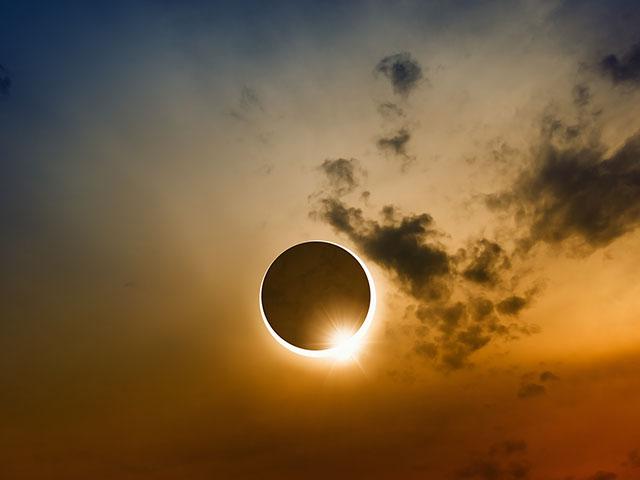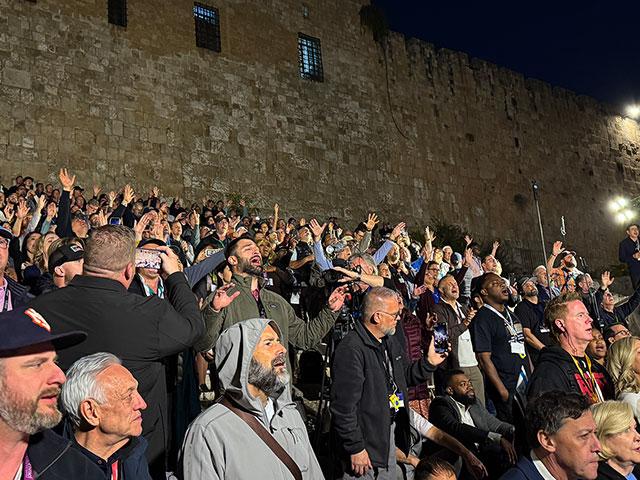The upcoming Aug. 21 eclipse is causing such a stir because one like this hasn't crossed the entire continental U.S. in 99 years. And directly under its path, millions of people will see a rare total solar eclipse.
"It's unique basically based on its position — the fact that it's coming right over so many states in the U.S.," astronomer Bethany Cobb Kung of George Washington University told CBN News.
Kung indicated that in this age of social media and the internet, this solar/lunar spectacular is likely to be history's most talked about eclipse.
"Eclipses are both interesting scientifically — we learn a lot about the sun, especially the solar corona, during an eclipse — and it gets people excited about astronomy," she stated. "So we're looking forward to it and we know we're going to get a lot of news coverage and people are going to be interested. It's going to be live-streamed on the web. People are going to be sharing it on social media."
Hugh Ross is both a minister and astronomer, as well as founder of the group Reasons to Believe, which uses science about creation to point to a Divine Creator. He said this Aug. 21 eclipse is definitely special.
"About a third of all the eclipses that do take place are not total," Ross explained. "The moon's disc is not quite big enough to block out all of the sun's disc. So you actually see a circle of light all around the moon. But on Aug. 21, there will be a total solar eclipse where it's going to get dark."
It will be so dark, in fact, that temperatures may drop some 20 degrees. And animals of all kinds are likely to freak out at nighttime darkness suddenly arriving in the middle of the day.
The first place in the U.S. to get hit by the total eclipse will be Government Point, Oregon, at 10:15 a.m. There it will last one minute and 58 seconds, according to Astronomy.com.
But by the time it reaches Giant City State Park just south of Carbondale, Illinois, it will last 2 minutes and 40 seconds.
You can find plenty more fun and fascinating facts at The Great American Eclipse and TheSpace.com.
It May Be Too Late to Get a Room
Under the 60-to-70-mile wide path of totality, there may not be an open hotel room stretching from Lincoln City on the Oregon coast all the way to Charleston on the South Carolina coast.
"Completely booked," is what Kung's betting, "because people have been planning this for years, because we knew years in advance it's going to happen."
"And then people looked at the weather predictions: Where is the best chance going to be to have a cloudless or at least mostly cloudless day? Then people booked those hotels," she said.
For those who want to travel to a spot where they can clearly see the Aug. 21 eclipse in its totality, Kung had this advice: Do your research.
"The path of totality is only about a hundred kilometers wide. If you're trying to go to totality, you really need to get online; look at your longitude and latitude very carefully," she advised. "There are plenty of resources online. You can download phone apps that'll tell you at this longitude and latitude what will be the percentage of sun covered."
Plenty of Resources
Here are several sites and apps Kung mentioned to CBN News:
- Experience the 2017 Eclipse Across America
- NASA's Eyes: Eyes Eclipse 2017
- American Astronomical Society
- 2017 August 21 Total Solar Eclipse
- Xavier Jubier's 2017 Total Eclipse Interactive Google Map!
- Total Solar Eclipse 2017 App
Kung is guessing millions of people will be descending on communities all across America that are not used to crowds.
"If you're trying to get there, just be warned that a lot of people are also going to be trying to get there," the GWU astronomer warned. "So plan ahead because traffic and things are going to be interesting that day. And if you can't get there, again there'll be web-streaming; NASA's going to be doing it."
Since it's August, the skies may be particularly clear for eclipse-viewing, especially in places like high-and-dry southeastern Oregon.
"If you look at the historical weather patterns, particularly for the western United States, the odds are very good that there'll be clear skies," Kung explained. "And that's one of the reasons that people are predicting it's going to be the most seen eclipse in a long time -- because the weather potentially will be quite good."
Minister and astronomer Ross and his fellow scientists at Reasons to Believe are taking full advantage of this opportunity.
"It's going to be a spectacular event," he predicted. "And we've got a group of about 140 people going with us to the desert of Oregon to view that eclipse. And one of our other astronomers is going to join me."
He added, "We're going to give lectures on the astrophysics of the sun and why we're in such a blessed time in the history of our solar system, that we can learn a lot of things that actually help us understand why God's behind it all."
Eclipse Crosses Trump Country
Those who love their politics might be interested to know the path of totality is going to cross over many more Donald Trump voters than Hillary Clinton voters.
According to the Boston Globe, some 240 counties are on that path, "and about 92 percent of those counties swung in Trump's favor, while fewer than two dozen counties voted for his opponent, Hillary Clinton."
This isn't too surprising, though, since Trump captured 84 percent of the nation's counties, while Clinton's biggest vote totals came from big urban areas not along the eclipse's path of totality.
The Globe also mentioned this galling fact for the former secretary of state: "Even Clinton voted for Trump — Clinton, Missouri, that is. The county lies right along the heart of the total eclipse's path, and 69.2 percent of voters there cast their ballot for Trump."
The Whole Continental U.S. Gets Eclipsed
Kung said even for those not right in the path of totality, if they're in the continental United States, they can enjoy this particular eclipse.
"There's still going to be a partial solar eclipse throughout the entire U.S. So here in Washington, D.C., for example, the sun's going to be about 80 percent blocked," the GWU astronomer explained.
But Kung warned, "Now you can't see that with your naked eye, but with eclipse glasses or through a special telescope. You can see a pretty cool event where a lot of the sun is going to be blocked."
"My plan, if the weather is good, is to take a small telescope that has a filter so you can safely observe the sun through it," Kung said. "I'm going to set that basically outside my office in the middle of Kogan Plaza on the GW campus and just grab anybody who happens to be walking by and say, 'Hey, you want to see a solar eclipse?'"
Shadow Racing at 800 Miles Per Hour
Ross expects excitement even before the full eclipse arrives – and as it departs.
"We're going to try to get our telescopes up on top of a hill where people will be able to watch the shadow of the sun race towards us at about 800 miles an hour," he explained. "And when the eclipse is over we're going to be able to watch the shadow rush away. And that helps because the eclipse itself is only going to be about two-and-a-half minutes."
Kung said, "Enjoy the experience of being there. The totality only lasts for a couple of minutes. You get basically two minutes of this. So don't be fooling around with your digital. Just experience it."
Sunglasses Won't Do the Job
There's a serious warning, though, going out across America. Viewing the eclipse without the proper protection can permanently damage your eyes. And don't assume sunglasses will protect you.
"No, sunglasses are not safe," Kung stated. "The sun is so bright that you can really damage your eye. You can literally burn your retina if you look at the sun without any protection."
"And it's so bright, you need to block 99.99 percent of the light in order to look at it safely. So the only way you can do that is to get solar eclipse glasses," she said.
She warned buyers need to beware.
"Buy them from a reputable place," Kung advised. "NASA's website, the American Association of Astronomers' website, will tell you where you can safely go to get these glasses. But don't try to look at it with your naked eye."
The astronomer explained how this hi-tech age means there are even more dangers.
"What's different now is the technology. Everybody has the cell phone camera. Astronomers would caution you greatly: Do not try to take a picture of the eclipse. It's very dangerous," she warned, especially if you have zoomed in.
Kung's advice: "Leave the photography to the professionals. Don't be down looking at your phone while this is going on. Just experience it. Just look."
Did you know?
God is everywhere—even in the news. That’s why we view every news story through the lens of faith. We are committed to delivering quality independent Christian journalism you can trust. But it takes a lot of hard work, time, and money to do what we do. Help us continue to be a voice for truth in the media by supporting CBN News for as little as $1.












 Support CBN News
Support CBN News









